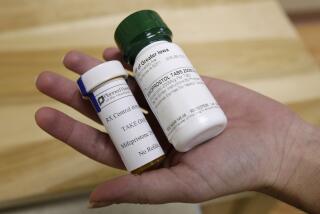Women still prefer short-acting contraceptives
Despite a public health initiative to educate women about the benefits of long-term, reversible contraceptives, such as intrauterine devices, most women still prefer permanent or short-acting methods, according to research presented Tuesday at the annual meeting of the American Society for Reproductive Medicine.
The study, from the National Survey of Family Growth, showed that almost 90% of women of reproductive age were currently using contraception. Almost one-third were using permanent contraception, such as sterilization, and 28% were using short-term hormonal methods, such as the pill. Just over 15% were currently using short-term barrier contraceptives, such as a diaphragm. Reversible, long-term methods, such as the IUD or a hormonal implant, were used by about 7%.
The data were gathered from 2006 to 2008.
In other news from the ASRM meeting Tuesday, researchers suggest that new egg-freezing technology, which can allow women to postpone childbearing, is not having the effect that it could have because women are waiting too long to freeze their eggs.
A study by doctors at Reproductive Medicine Associates in New York found that most women are in their mid- to late 30s when they seek egg-freezing services. By that age, fertility has already begun to decline, which affects the success of egg freezing. However, data since 2005 show the average age of women freezing their eggs has dropped from 39 to about 37.
Another study presented at the meeting found that implantation rates using eggs that had been frozen decline in women as they age. Implantation rates using frozen eggs were about 10% in women younger than 30 and 4.7% in women older than 40.
Return to Booster Shots blog.
Follow me: twitter.com/LATShariRoan






